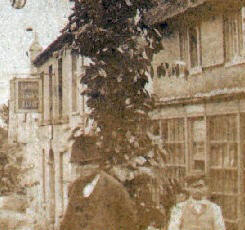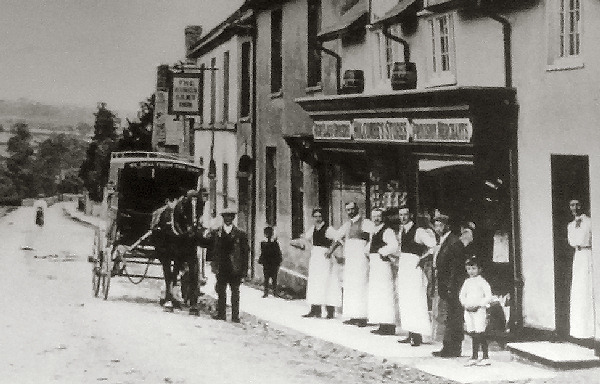Winsham Shop, (in the background on the right) has been in the same spot for at least 160 years, maybe much longer.

| WINSHAM SHOP- the village's oldest and most durable
business. Winsham Shop, (in the background on the right) has been in the same spot for at least 160 years, maybe much longer. |
 |
| The first record we have of this durable enterprise is for 1851, when the Census of that date tells us that Daniel Hitchcock was the proprietor and carried out a business in selling groceries and drapery. He was also the Postmaster, a new task which would have been in response to the massive increase in letters that had arisen from the reforms to the postal service in 1840. These were pioneered by Rowland Hill. and led the way to the universal pre-payment system and the introduction of the postage stamp, the most popular being the Penny Black and the Two pence Blue. So popular was this innovation, the letter traffic increased in Britain from 76million in 1839 to 350 million by 1850, an increase 360%. This would have been a response to improving standards of literacy among the general population, more rapid delivery due to the introduction of railways to carry mail and the rapid expansion of the British economy due to the fruits of the Industrial Revolution. In 1861 the Post Office Savings Bank opened, and this service would have provided a secure place for ordinary Winsham people to deposit any spare money. In 1871, records tell us that David Andress had taken over the business, but is listed as the Sub Postmaster. This may have meant that the Post Office business had grown to the extent that one person could not manage it. We know that by 1889 Robert Fowler Sylvester had taken over the business, and while continuing to sell groceries and draperies, he is listed as Post Master, a position he held into the 1920s. Sometime in the last quartile of the 1800s a serious fire ravaged the thatch roof of the shop and adjoining premises, including the Old Kings Arms. It was after this event that it is believed that the distinctive dormer windows and a slate roof were added to Post Office House, as it is now known. By the turn of the century the Post Office was very busy. In 1900, following deliberations and a financial commitment from Winsham Parish Council, the Electric Telegraph service reached Winsham. As a result the Post Office moved from the shop premises to a building across Church Street, next to the Jubilee Hall and adjacent to The Bell.  Winsham shop just before the Great War By 1910 H.R. Holcombe had taken over the grocery business. It is unclear if he had continued with the drapery business, although it seems likely that they would have carried some lines. Dress making was an important part of a womanís work in those days, and sewing materials were essential to the maintenance of clothes. A hundred years later, socks, for example, are rarely darned; they are mostly thrown away when in need of repair! Then came the Great War (1914-1918). Many men enlisted, and perhaps the Post Office delivery service was run by the ladies of the village, to supplement the miserable allowances that they would have received from their soldier husbands. We just donít know. We do know that twenty four of the Winsham men did not come back from the war-a significant number for a small community. Post World War II-A time of change The Grocery trade carried out by the shop until the 1950s would have been very different from the way it trades to-day and indeed most of the last half of the 20th Century. There would have been competition from the other shops selling groceries in Winsham, but prices would have been higher than in the working class areas of a large city. Vegetables would have been seasonal, and many Winsham families would have grown their own, so sales were probably limited. Many people kept a few chickens so had their own eggs, or could buy a neighbour's surplus. Barter deals probably took place . Quantities of commodities purchased would generally be small, purchased by the ounce or by value-a pennyís worth or something like that. Packaging for small quantities was virtually non-existent. Biscuits came in big tin boxes that needed to be unpacked, and sold by weight, requiring them to be placed in a paper bag. Broken biscuits were cheaper! The task of packaging applied to tea and sugar and a host of other things. Soap was not wrapped. Many of the things that we now regard as essentials such as bottled water, washing up liquid and frozen food for example did not exist at a retail level. No doubt quite a few purchases were put 'on the slate', awaiting the end of the working week and payday! No credit or debit cards. A nice thing would have been the host of smells and aromas that assaulted you when you entered! Supplying the farms and the 'big houses' some distance from the village would have been an important part of the business, involving some means of transport. In 1925, Mr Charles Appleby bought the Shop, and it became known as Appleby and Sons, but Mr Sylvester remained as Post Master at the Post Office, which continued until 1928 or thereabouts. Mr Appleby had two sons, Basil & Ted and four daughters, Eileen, Mavis, Peggy & Jean. Don Pattimore, in 1936, on leaving School, went to work at the Shop, where he did all sorts of work. It seems that the Post Office had by then moved back into the Shop, as he delivered Telegrams (using the same bicycle that he used for delivering grocery orders). There was also a lot of work bagging up tea, coffee beans and other commodities. By 1935 the shop had also acquired a delivery van. Electricity had arrived in the village by the mid 1930s, but it is not known if it extended to the shop for lighting and refrigeration. Very few homes in the village had the utility installed. Then came World War II, with food rationing, with the men disappearing again off to fight. Fortunately the death toll was much lower this time. Once again the women stepped into the breach, some joining the Land Army. The village also had many evacuees, children sent into the countryside to avoid the bombing in the cities. Keeping track of their ration books must have been an additional problem. The Appleby family ran the Shop until sometime in the 1950s, when it was taken over by Mr & Mrs White, with Miss Creech running the Post Office . The next four decades saw a succession of owners. But the nature of the business was changing. Supermarkets began to open in the towns all over the country. With highly competitive prices, a wide range of merchandise, attractively presented, they became a real threat to the existence of small shops everywhere, town and country alike. However, it was not until the nineteen seventies that this closed all but one shop in Winsham.
After 150 years Winsham Shop was to close. The current owners had decided to move away from the Winsham. The prospect of anyone who purchased their property wanting to continue with the business was considered to be very remote. The Transition to Community Ownership Faced with the imminent closure-probably within six months- a question that was being asked by the village was what could be done about it. Many residents reluctantly accepted it as inevitable, but Richard Rose and Stella Abbey talked the problem over with Robert Shearer and they decided that an attempt should be made keep the shop open. A 'steering group' was formed, led by Robert Shearer who was to become the first Chairman of the company that would be formed. Few of this group had much, if any experience of running a small retail business. Robert was Medical Director of a large London Hospital! Others were scientists, farmers, etc. Roger Tett was the only one with retail experience, which was very valuable, especially when trading started. Above: Some of the Shop Steering Group at the Public Meeting in 2002 Left to right: Bob Elkin, Roger Tett, Stella Abbey, Tony Laws-Spindler, Mary Pye, Robert Shearer, Margaret Long, Anne Rose. A few villages around the country had been successful in rescuing their shops from similar situations. Advice was sought from the Village Retail Services Association and the Countryside Alliance and other advice groups. Visits were also made by members of the steering group to village owned shops in the South West, to gain from their experience. Money would be needed to purchase any existing stock and negotiate a new lease. A village owned shop would also need working capital. It would also need to recruit a sizeable number of volunteers to spread the load of many tasks within the shop that had been done by the previous proprietors. Of course, a small core of employed staff would still be needed. Very importantly, a business model was needed that would enable it to become a viable and on-going project. With the help of a grant, a company was formed. Further capital was raised by selling shares to some two hundred people around the parish, and borrowing money from the community using 'no interest' loan notes. Shareholders were told not expect a dividend from their investment. Helpers were recruited-from shelf-stacking, organising newspapers-a task that started every morning at 6.30am, book-keeper, counter staff and so the list went on. A team of over twenty people signed up to help, and in 2012 that number remains much the same. Then as now, this team is led on a day to day basis by Roger Tett, an experienced retail manager, and Denise Nicholls. Importantly, the Post Office service would continue, and negotiations with Post Office Counters Ltd, the managing body, were started. Robert Shearer was to become the first Chairman of Winsham Shop Ltd. He was followed in 2005 by Jeremy Leighton, and then the present Chairman, Denis MacCullum. The new enterprise opened, seamlessly transferred from the previous owners, in September of 2002.
The venture has been a success. Ten years on it is a lively business. Its auditors stated at the recent AGM that it was difficult to see how the business could operate more efficiently in financial terms. From a village customer view point it stocks a good range of merchandise, minimising the need to visit the local towns for basic items. Of course , it is a small business in both the physical sense-the shop is small-and financial resources. Few people do their main weekly shop in Winsham, but for daily , casual and 'emergency' needs it meets the requirements of many, and prospers accordingly. Just as important, it can be said that it is the beating heart of village life. In addition to providing merchandise, it acts as a major communications centre by providing a place for people to meet while doing their shopping. It provides a Notice Board facility, free to many; a shop window space for promoting village events and a distribution point for items such as the Joint Parish Magazine and village leaflets. It provides an invaluable service in selling advance tickets for village events and providing a facility for sponsored events, petitions and village related surveys. Fuller details of what the shop does can be found on the Winsham Parish Web Site-www.winsham.org.uk. January 2013 But the story does not end . Learn more about the journey of an 150 year old village shop into the 21st century, a story of existential threat, disappointment, resurrection and pandemic: Part 1-The transition from private to village ownership to community ownership Click HERE Part 2- The first ten years Click HERE Part 3-Existential threat Click HERE Part 4-A change of direction Click HERE Part 5- Open for business Click HERE |